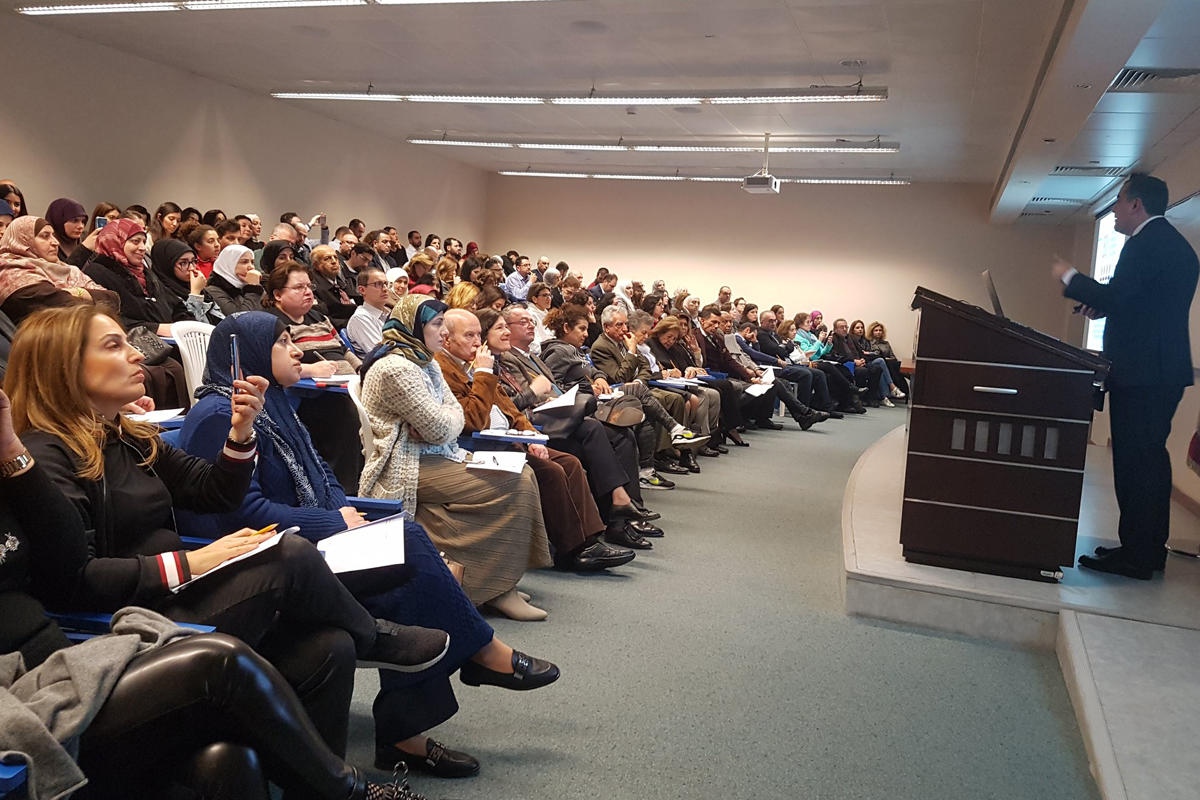The Low-Down on Longevity
The Alumni Relations Office hosts a talk by interventional cardiologist Dr. Omar Hamoui on leading a long and healthy life.
With the steady increase in life expectancy, we would do well to heed evidence-based guidelines for good health so that we may not only live longer, but better. In doing so, we should steer clear of any advice by unreliable sources, such as alarmists and opportunists, on social media.
This was the caveat given by interventional cardiologist Dr. Omar Hamoui in his research-backed lecture on Habits and Tips for a Long and Healthy Life. As one of the Alumni Relations Office’s Stay Aware series, the event attracted a full house on January 24.
“These lectures, and the Keep Learning series serve to inform the community on a variety of topics and issues,” said Assistant Vice President of Alumni Relations, Abdallah Al Khal. “The role of the university as an educator does not end with its cohorts’ graduation.”
Starting off with the epidemiology – the study of health-related determinants – of aging, Dr. Hamoui delved into dietary concepts and studies on life expectancy.
Citing a UN 2017 World Population Prospects Report, he revealed that while the global fertility rate has halved in the span of 60 years, the population has risen to 7.6 billion, and could reach 8 billion in five years. “For the first time in history, in 2017, there were more people over the age of 65 than children under the age of 5,” he said. “This trend is continuing, and will continue to do so for the next 20 years plus.”
The phenomenon has elicited extensive studies on the epidemiology of life expectancy – such as the Albert Einstein College of Medicine Longevity Genes Project – that looked into the particular habits, lifestyle and diet of centenarians. Findings indicated that longevity is in fact genetic.
“People who lived longer had very good cholesterol and three sets of protective genes, against cancer, heart disease and Alzheimer’s,” said Dr. Hamoui. This went to explain why someone, like Guinness World Record holder and confirmed centenarian Jeanne Louise Calment managed to live to 122 years of age, although she was a heavy smoker. Others, not genetically predisposed to longevity, would not be immune to the damage bad habits can cause.
This is all the more reason why we should take good care of ourselves. Given that “between the ages of 40 and 70 on average, we lose half of our health, and the other half between 70 and 80,” we should start safeguarding our mental, physical and emotional wellbeing at an early stage. Like money in the bank, said Dr. Hamoui “where you can have 0 percent or 3-5 percent interest in your account that may not make a difference in the short term, but will do so over 30 years, health consists of small things that over time make a huge difference.”
In that respect, a good diet does play a part, but is contingent on so many variables – such as meal frequency and timing, sleep deprivation, and the body’s microbial content, among others – that dietary recommendations become confusing.
But what is beyond question is that “diet impacts cholesterol only to a certain extent,” with medication being more effective, and that “sugary drinks are highly detrimental, and fiber, based on solid data, is essential for heart health, cancer health, diabetes, and a long life.”
While people seem to fear cancer the most, cardiovascular disease, noted Dr. Hamoui, was actually “the number one enemy for adults, and the cause of death in 46 percent of cases in Lebanon.” Of the three most dreaded diseases – cancer, a heart attack and Alzheimer’s – the latter is the most impactful on life expectancy and health, and poses a huge economic burden on society.
So what are the tips for a long healthy life? Here, Dr. Hamoui cited the research conducted by Professor of Psychology at Brigham Young University, UK, Julianne Holt-Lunstad.
Based on 148 studies, which included 308,849 participants, that looked at all parameters, Holt-Lunstad arrived at “nine effective factors that will impact life expectancy.” These were, in ascending order of importance: clean air, managing hypertension, a good weight, exercise, cardiac rehabilitation in the case of heart disease, the flu vaccine, no alcohol consumption and no smoking. Top of the list was close relationships and social connections, which helped mitigate health risks.
The thought-provoking talk invited countless questions from attendees, eager to know more about managing cholesterol levels, stress, saturated fats and nutritional supplements.
